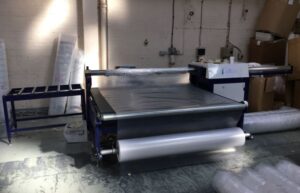Global engineering company fined after employees exposed to chemical spill
The fabrication division of Nasmyth Technologies Limited has been fined after four employees were exposed to hazardous substances that caused significant ill health and time off work as a result.
Poole Magistrates’ Court heard how, on the 9 October 2017, between 150 and 200 litres of a chemical preparation, that included hydrofluoric acid, spilled across a large area of the factory floor in Wimborne, Dorset. Four workers were involved in the clean-up that took several hours. They were provided with inadequate personal protective equipment (PPE) and respiratory protective equipment (RPE) to undertake a clear up, for which they had no training. Some of them suffered ill health following the incident, which included an asthma attack, a severe headache, nausea, sore eyes and throat. One of the workers, whose symptoms persisted, was referred by his doctor to a specialist for treatment.
An investigation by the Health and Safety Executive (HSE) found that there was significant non-compliance regarding management of substances hazardous to health. The company had failed to carry out a suitable and sufficient assessment and had not prepared for this emergency situation. One of the failings was that the RPE (face masks) provided did not have the correct type of filter for protecting against hydrofluoric acid gas. Additionally, the type of RPE provided to workers relied on a good seal against the face in order to protect workers and no face fit tests had been undertaken to ensure the masks fitted the workers’ faces. Furthermore, workers were unshaven meaning their beards or stubble prevented an effective seal of the RPE to their faces.
Nasmyth Technologies Limited of Nasmyth House, Coventry Road, Exhall, Coventry pleaded guilty to breaching Section 2(1) of the Health & Safety at Work 1974 Act. They were fined £13,000 and ordered to pay costs of £9,551.
Speaking after the hearing, HSE inspector Berenice Ray said: “This incident could have so easily been avoided had the company firstly undertaken a suitable and sufficient risk assessment and then implemented the necessary controls, including emergency arrangements for dealing with a chemical spill and the provision of instruction and supervision to ensure safe working practices are followed.
“Companies should be aware that HSE will not hesitate to take appropriate enforcement action against those that fall below the required standards.”
Notes to Editors:
- The Health and Safety Executive (HSE) is Britain’s national regulator for workplace health and safety. We prevent work-related death, injury and ill health through regulatory actions that range from influencing behaviours across whole industry sectors through to targeted interventions on individual businesses. These activities are supported by globally recognised scientific expertise. hse.gov.uk
- More about the legislation referred to in this case can be found at: legislation.gov.uk/
- HSE news releases are available at http://press.hse.gov.uk
- The Control of Substances Hazardous to Health Regulations 2002 (COSHH) is the law that requires employers to control substances that are hazardous to health. For more information on this, see https://www.hse.gov.uk/coshh/basics/index.htm
The post Global engineering company fined after employees exposed to chemical spill appeared first on HSE Media Centre.
